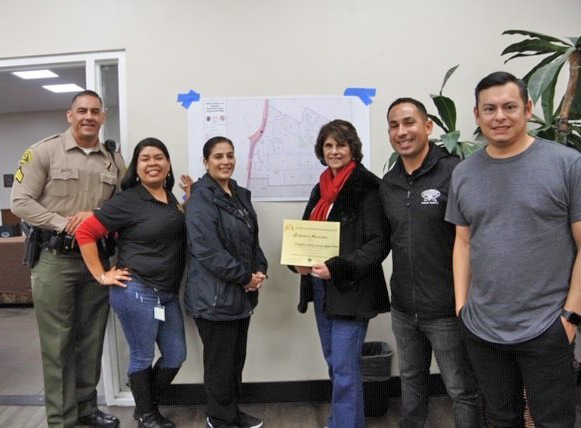Next month, the Paramount Unified Board of Education is expected to vote on a proposed contract to take a survey of the community’s views on the possibility of imposing term limits on the governing board of the school district. At the May 13 meeting, the board also heard a lawyer’s presentation on making the transition from district-wide elections to elections by “trustee” areas. On May 13, Superintendent Ruth Perez told the board that the survey contract would come back to the board in June.
The board had previously asked for information about term limits and putting the issue on the 2020 ballot.
The board has taken no action at this time to either impose term limits or to change the way the board members are elected in the school district.
Currently, PUSD board members have no term limits.
Currently, school board members are elected by voters throughout the Paramount Unified School District.
Legally, they are two separate issues and will have to be addressed separately.
The survey
At the May 13 meeting, board members indicated they wanted the number of questions whittled down to 12 (from 23). The board members also wanted to confirmation of the cost of the election and whether it would make a difference if the district put both trustee areas and term limits on the 2020 ballot.
Based on the direction given by board members, the proposed survey would only address the issue of term limits. However, it would not address such specific details as the length of the term limits—eight years or 12—or whether a board member could term out and then seek re-election after sitting out a term. (For example, the city of Seal Beach limits City Council members to two consecutive four-year terms. Termed out council members have to wait four years before they can seek re-election. On the other hand, the President of the United States is limited to two consecutive terms, period.)
Trustee areas
At the request of the Board of Education, Todd M. Robbins, a partner in the law firm of Atkinson, Andelson, Loya, Ruud and Romo, gave the board a presentation on changing the way school board members are elected from district-wide (or “at large”) to five “trustee areas.”
Five trustee areas would basically divide the Paramount Unified School District Area into five sub-sections and trustees would have to reside in those areas to run for office.
If no one runs in a particular trustee area, the Board of Education would have to find and appoint someone to serve on the board.
The California Voting Rights Act of 2001 says at large elections must not be applied in a way that doesn’t allow “a protected class” of voters from electing a candidate of that group’s choice, according to Robbins.
Proof of intend isn’t required, according to Robbins.
Robbins said Voting Rights lawsuits over at large elections become “a battle of experts.”
“Our demographer says this; their demographer says that,” Robbins said.
He described such cases as “guessing games.”
“It’s a significant litigation risk,” Robbins said.
He also said that winning a case doesn’t protect you forever. He said that win is only as good as the next election.
And school districts that win won’t get legal fees. Plaintiffs that win can be awarded their legal fees, according to Robbins.
He described the process for a Voting Rights Act lawsuit: a prospective plaintiff sends a letter to the entity (school district, city council, etc.) that asserts the act was violated.
The entity has 45 days to pass a resolution of intent to make the transition to by-trustee area elections. The plaintiff can’t sue for 90 days after (and if) the resolution is passed. The prospective plaintiff can demand reimbursement for costs up to 30 days after the resolution is adopted. The entity has 45 days to reimburse the prospective plaintiff up to $30,000.
Robbins said that, according to his notes, approximately 191 jurisdictions have gone through the process.
According to Robbins, even if the issue is put to the voters and they reject trustee area elections, that election does not protect the jurisdiction from a California Voting Rights Act lawsuit.
Editor’s note: Because of the Paramount Journal’s print production schedule, school board stories generally will not appear in print until the week after a board meeting is held.















